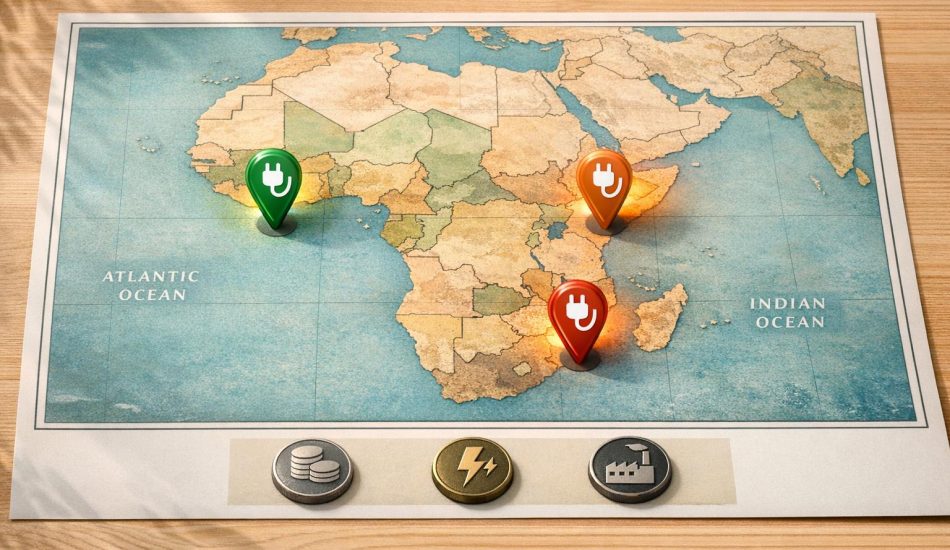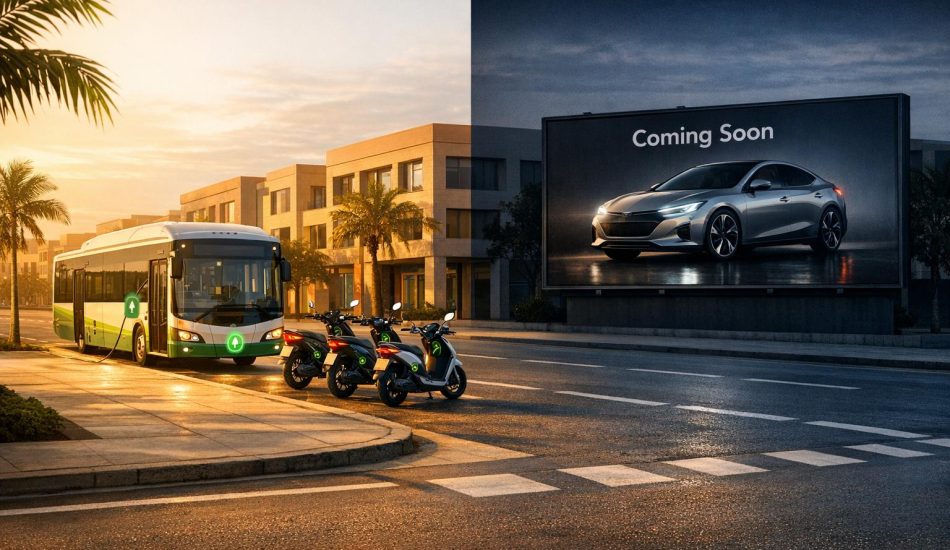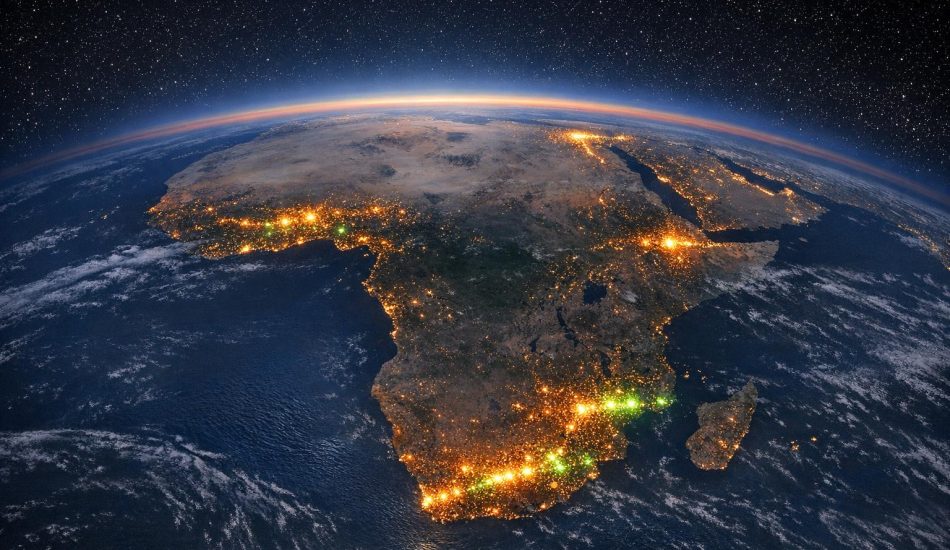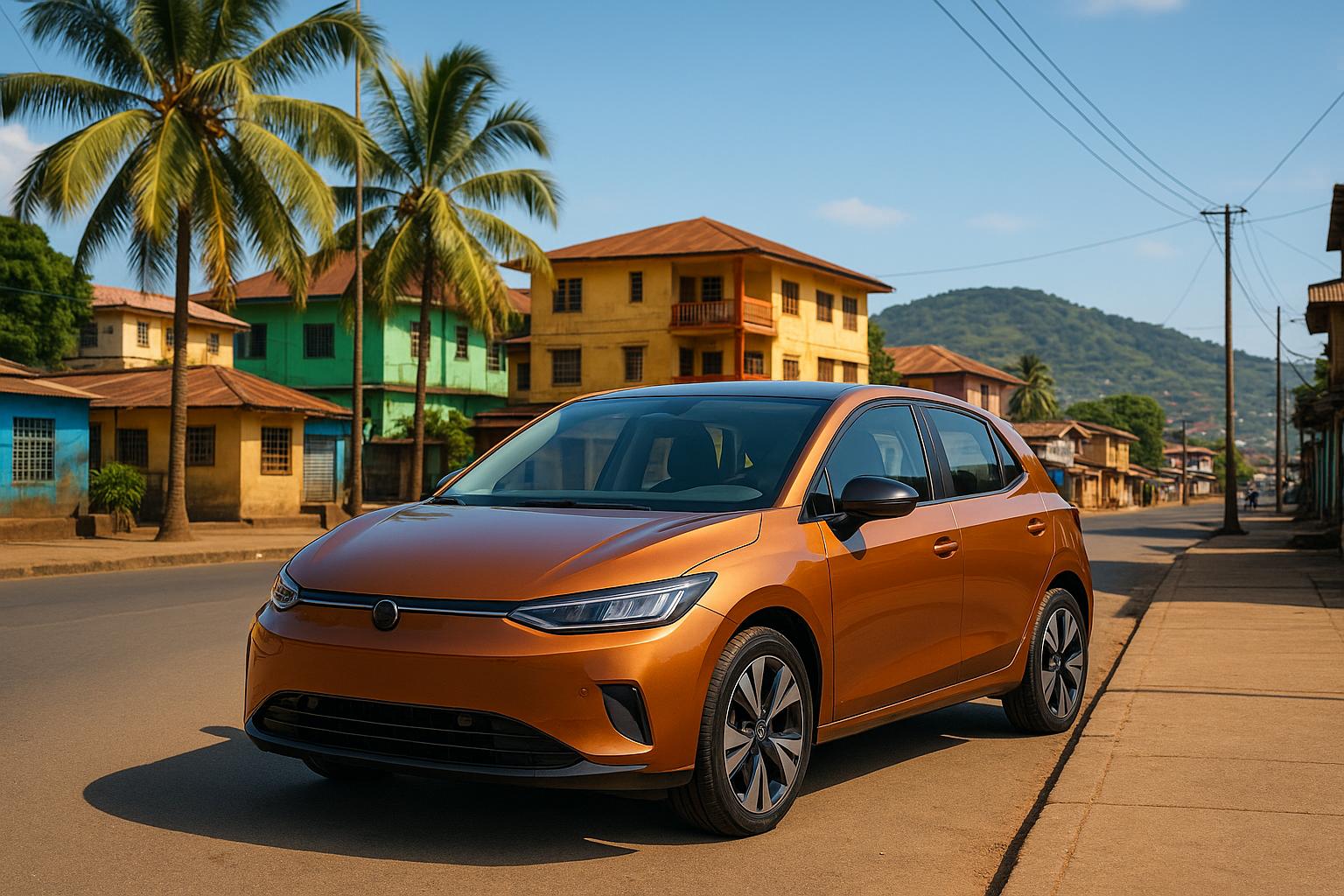
Electric vehicles (EVs) are transforming transportation in Sierra Leone by reducing costs, improving air quality, and supporting the country’s move toward sustainable energy. Here’s what you need to know:
- Top EV Models for 2025:
- BYD Dolphin: Affordable, reliable, with up to 427 km range.
- Changan Eado EV: Balanced performance and price, offering 401 km range.
- Shineray T3ev: Built for business, with a 300 km range and high cargo capacity.
- Key Features to Consider:
- Affordability: EVs save up to 70% on operating costs compared to gas-powered vehicles.
- Durability: Models adapted for Sierra Leone’s rough roads and power outages.
- Charging Options: Battery-swapping centers and growing charging networks are available.
- Benefits of EVs:
- Lower energy costs (as little as $1.50 per charge).
- Reduced air pollution and health risks.
- Support for local lithium resource development.
Neev Salone Unveils Sierra Leone’s First Eco-Friendly Electric Vehicles! 🌍🏍️🚗

Quick Comparison Table
| Model | Starting Price | Range | Motor Power | Cargo Capacity | Best For |
|---|---|---|---|---|---|
| BYD Dolphin | $29,990 | 340–427 km | 70–150 kW | Standard boot | Personal use, long trips |
| Changan Eado EV | ~$17,300–23,100 | 401 km | Not specified | 450 liters | Daily commutes, families |
| Shineray T3ev | $68,800 | 300 km | 60 kW | 1,595 kg | Business, cargo transport |
Sierra Leone is embracing EVs with improved infrastructure, government support, and cost-saving benefits for drivers. Read on to explore the best EVs for 2025, their features, and tips for ownership.
Key Factors When Choosing an Electric Car
Picking the right electric vehicle (EV) for daily life in Sierra Leone involves weighing several important factors. The country’s diverse road conditions and power supply challenges make it essential to focus on specific features that suit the local environment. Here’s a closer look at what to consider.
Affordability and Total Cost of Ownership
Electric vehicles may come with a higher initial price tag compared to traditional fuel-powered cars, but the savings over time can make up for the upfront cost. For example, e-kekes in Sierra Leone cost about 1.2 to 1.5 times more initially, but their daily operating expenses are significantly lower – just $1.50 compared to $5.00 for gas-powered alternatives, resulting in a 70% reduction in costs.
"Instead of spending on fuel daily, users will only need to charge their vehicles twice a week." – Emmanuella Sandy, Deputy CEO and Director of Operations at NEEV Salone
When assessing the total cost of ownership, don’t forget to include the price of installing a home charger and the availability of public charging stations. Government policies, such as duty-free concessions for EV imports, can also help lower the upfront cost for certain models, as seen with NEEV Salone’s first EV order.
Durability and Local Suitability
Sierra Leone’s tough road conditions and frequent power outages demand EVs built to handle these challenges. In 2017, the country experienced an average of 53 unplanned blackouts per day, making battery reliability and backup charging options crucial. Vehicles with sturdy batteries and systems designed for power fluctuations are a better fit for this environment.
Key features like high ground clearance and strong suspension systems are essential for navigating uneven roads. For instance, Ampersand‘s e-motorbikes, specifically made for Sub-Saharan Africa, highlight the importance of vehicles tailored to regional needs.
Battery swapping is another practical solution to cope with inconsistent electricity. NEEV Salone’s charging and battery-swapping center offers a convenient alternative to traditional charging methods. Additionally, EVs are far more energy-efficient, operating at about 90% efficiency compared to just 12–40% for internal combustion engine vehicles.
Charging and Maintenance Support
A dependable charging and maintenance network is key to a smooth EV ownership experience. NEEV Salone has taken the lead in Sierra Leone by creating a robust support system, which includes charging facilities, maintenance services, and training programs in collaboration with the University of Sierra Leone.
"With durable charging facilities, these e-keke can operate for extended hours, offering a reliable alternative to fossil-fuel-powered vehicles." – Mr. Rex Bonapha, Deputy Minister of Transport and Aviation
The government is also working to expand EV infrastructure, with plans to increase charging stations and maintenance centers across the country. As part of the EPA-SL’s E-Mobility Strategy, pilot charging stations are being introduced to gradually build a wider network, making EV charging more accessible.
When choosing an EV, consider how close charging stations are to your regular routes and whether skilled technicians are available for maintenance. These factors are crucial for ensuring a reliable and efficient EV experience in Sierra Leone.
Best Electric Cars for Daily Use in Sierra Leone (2025)
When it comes to electric vehicles (EVs) that suit the unique demands of Sierra Leone, three models stand out as excellent choices for daily driving. These vehicles have been selected for their ability to handle the challenges of the local environment while delivering dependable performance and practical features.
BYD Dolphin (2025)

The BYD Dolphin has gained attention as one of the most budget-friendly EVs in Sierra Leone, with a starting price of $29,990 before additional costs. This price point makes it comparable to many traditional small cars, breaking down the cost barrier often associated with EVs.
Range and Performance: The Dolphin comes in two versions. The Essential model offers a WLTP-certified range of 340 kilometers (211 miles) per charge, powered by a 70 kW motor with 180 Nm of torque. For those needing more range, the Premium variant extends it to 427 kilometers (265 miles) with a 60.48 kWh battery and a 150 kW motor providing 310 Nm of torque.
Built for Durability: Featuring Lithium Iron-Phosphate (LFP) Blade Batteries, the Dolphin prioritizes safety and long-term performance. BYD’s nearly three decades of expertise in battery technology shine through in this robust design, ensuring it’s ready for extended drives.
Practical Features: The Dolphin includes a Vehicle-to-Load (V2L) function, allowing it to power external devices during power outages – a highly useful feature in areas with inconsistent electricity supply. Additionally, its direct cooling and heating system enhances thermal efficiency by up to 15% in colder weather.
Warranty Coverage: The Dolphin is supported by a 6-year/150,000-km vehicle warranty and an 8-year/160,000-km battery warranty, giving owners peace of mind for the long haul.
Changan Eado EV (2025)
The Changan Eado EV offers a balanced mix of affordability, reliability, and efficiency, making it a practical option for Sierra Leone’s drivers. Changan’s established reputation for building durable and economical vehicles further strengthens its appeal.
Reliability and Performance: While specific EV specs are still being finalized, earlier models of the Eado deliver 158 horsepower and 260 Nm of torque. With seating for five and a 450-liter trunk, it’s a great choice for families or daily commuters.
Affordable Pricing: The Eado EV is priced between AED 64,000 and 85,000, which converts to roughly $17,300 to $23,100. This makes it an economical EV option without sacrificing essential features.
Adapted for Local Roads: Changan has shown a strong ability to adapt its vehicles to rugged road conditions, ensuring the Eado EV can handle Sierra Leone’s varied terrain.
Shineray T3ev (2025)
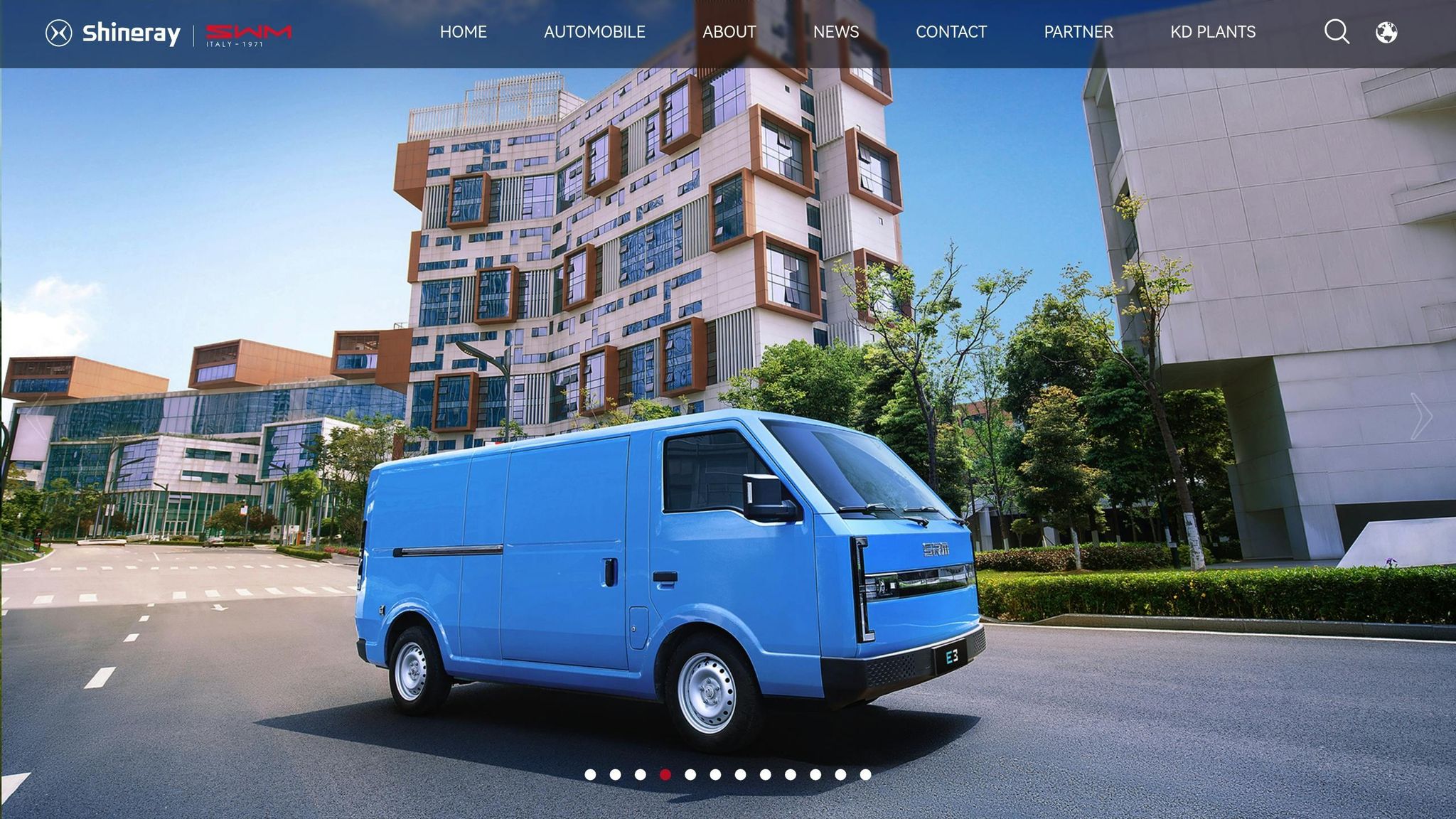
The Shineray T3ev is an all-electric commercial vehicle that also serves as a practical option for personal transportation, particularly for those with business needs.
Commercial Strength: Designed for work, the T3ev features a spacious cargo deck measuring 3,100×1,680×370 mm (about 122×66×14.6 inches) and can carry up to 1,595 kilograms of load. This makes it ideal for small business owners, farmers, or anyone who needs to transport goods regularly.
Range and Power: With a 53.58 kWh battery pack, the T3ev offers a range of approximately 300 kilometers (186 miles) per charge. Its permanent magnet synchronous motor delivers 60 kW and 220 Nm of torque, ensuring adequate power for both commercial and personal use.
Purpose-Driven Design: The two-seat cabin is designed for functionality, maximizing cargo space while still including essential features for daily driving.
Cost Consideration: Priced at $68,800 before additional costs, the T3ev is a more substantial investment. However, its ability to reduce fuel costs over time can offset the initial expense.
| Feature | BYD Dolphin Essential | BYD Dolphin Premium | Shineray T3ev |
|---|---|---|---|
| Range | 340 km (211 miles) | 427 km (265 miles) | 300 km (186 miles) |
| Battery Capacity | Not specified | 60.48 kWh | 53.58 kWh |
| Motor Power | 70 kW | 150 kW | 60 kW |
| Seating | 5 persons | 5 persons | 2 persons |
| Cargo Capacity | Standard boot | Standard boot | 1,595 kg payload |
| Starting Price | $29,990 | $36,990 | $68,800 |
These vehicles cater to different needs, from affordable personal transportation to heavy-duty commercial use. Whether you’re navigating city streets or hauling goods, these EVs deliver the reliability and efficiency Sierra Leone’s drivers are looking for.
sbb-itb-99e19e3
Electric Car Comparison
Comparison Table
Here’s a quick overview of how these EVs stack up for everyday driving needs in Sierra Leone.
| Feature | BYD Dolphin Essential | BYD Dolphin Premium | Changan Eado EV | Shineray T3ev |
|---|---|---|---|---|
| Starting Price | $29,990 | $36,990 | Not specified | Not specified |
| Range | 340 km (211 miles) | 427 km (265 miles) | 401 km (249 miles) | Not specified |
| Battery Capacity | 44.9 kWh | 60.5 kWh | Not specified | Not specified |
| Motor Power | 70 kW | 150 kW | Not specified | Not specified |
| Acceleration (0–100 km/h) | 12.3 s | 7.0 s | Not specified | Not specified |
| AC Charging Time | Not specified | Not specified | 8.5 hours | Not specified |
| DC Fast Charging | Not specified | Not specified | 48 min (to 30–80% capacity) | Not specified |
| Key Features | Front AEB, blind‑spot monitoring, adaptive cruise control | Heated front seats, panoramic sunroof, BYD Digital Key | Not specified | Designed for commercial transport |
| Warranty | 6 years / 93,200 miles | 6 years / 93,200 miles | Not specified | Not specified |
This comparison highlights each model’s core features, giving you a snapshot of what they bring to the table. Keep in mind, ultra-fast charging (over 120 kW) might cut battery life by up to 40% over time.
Pros and Cons
Here’s a closer look at what makes each model stand out – and where they might fall short.
BYD Dolphin Essential
The BYD Dolphin Essential strikes a solid balance between price and features. With a starting price of $29,990 and a WLTP‑certified range of 340 km, it’s a practical choice for daily commutes. Standard safety features like front AEB, blind‑spot monitoring, and adaptive cruise control add to its appeal. However, its 12.3-second acceleration might feel sluggish for those who value speed, and the smaller 44.9 kWh battery could mean more frequent charging if used heavily.
BYD Dolphin Premium
For those willing to pay extra, the BYD Dolphin Premium offers a more powerful and comfortable ride. Its 7.0-second acceleration and extended 427 km range make it ideal for longer trips. Premium touches like a 15.6-inch rotating touchscreen, heated front seats, a panoramic sunroof, and the BYD Digital Key elevate the experience. But with a price tag of $36,990, it may not fit every budget.
Changan Eado EV
The Changan Eado EV is a practical option with a WLTP‑certified range of 401 km, making it a reliable choice for daily use. Charging is convenient too, with an 8.5-hour AC charge time for overnight use and a 48-minute DC fast charge to go from 30% to 80% capacity. While details on additional features are limited, it’s a contender for those who prefer simplicity and functionality.
Shineray T3ev
Tailored for commercial use, the Shineray T3ev focuses on cargo transport rather than passenger comfort. It’s an attractive option for small business owners and entrepreneurs needing reliable goods transportation. Plus, for EVs in a similar segment, driving approximately 15,000 km annually could save about $814.50 compared to gasoline vehicles, helping offset the upfront costs.
Tips for EV Ownership in Sierra Leone
Buying an Electric Car via EV24.africa
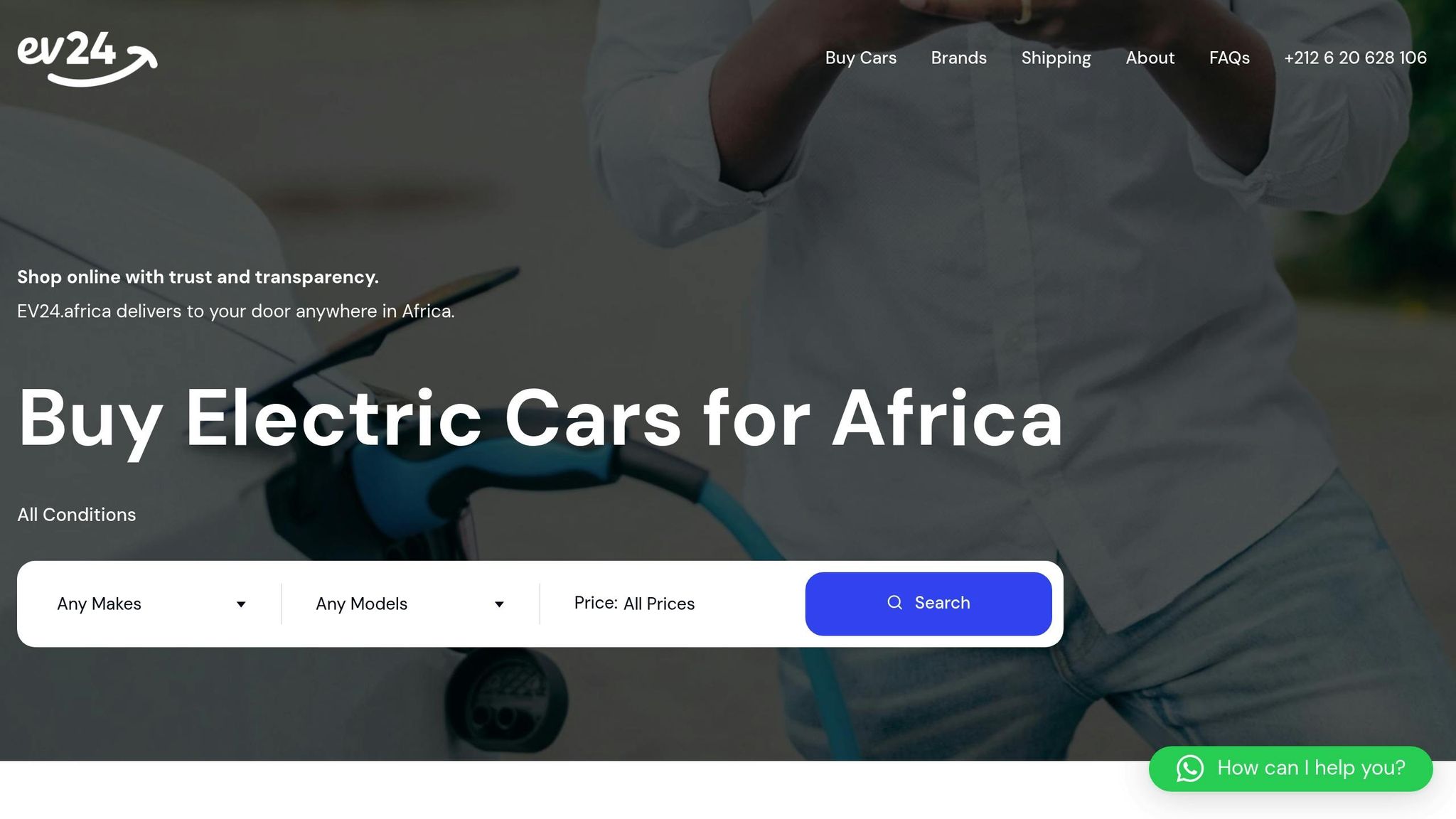
If you’re looking to buy an electric vehicle (EV) in Sierra Leone, EV24.africa is a great place to start. The platform provides a wide selection of new and used EVs from trusted brands like BYD, Changan, and Shineray. Each listing includes detailed specifications and transparent pricing, making it easier to find a car that fits both your budget and Sierra Leone’s unique driving conditions.
The site also offers flexible financing options and nationwide delivery. Plus, their expert team takes care of documentation and import requirements, saving you time and hassle. Before making a purchase, take advantage of the customer reviews and detailed specs available on the platform. These insights, often based on real-world experiences, can help you make a more informed decision.
Battery Life and Efficiency Tips
Once you’ve got your EV, taking care of the battery is key to keeping it running smoothly, especially in Sierra Leone’s tropical climate.
- Park smart: Protect your battery from heat by parking in shaded areas or pre-conditioning your car when it’s stationary.
- Charge wisely: Maintain your battery charge between 20% and 80% to extend its lifespan.
- Cool down after long drives: Let the battery rest for 15–30 minutes before charging.
- Drive efficiently: Smooth driving, maintaining proper tire pressure, and reducing unnecessary weight can significantly improve your EV’s mileage.
Your driving habits also play a big role in battery efficiency. Avoid overloading your car and use accessories sparingly to get the most out of every charge.
"Electric cars with all their amazing technology are really quite simple to maintain and cost roughly one third of what you’d typically spend to keep a gas-powered car serviced." – Dave Nichols, Marketing Copywriter for Lithia Motors’ online research center and GreenCars content
Charging and Maintenance Best Practices
Good charging habits and regular maintenance are essential for keeping your EV in top shape.
In Sierra Leone, you can rely on NEEV Salone’s Freetown Battery Charging and Swapping Centre and upcoming government-supported charging networks for dependable service. Always use the charger provided with your car or one recommended by the manufacturer. While fast charging is convenient, limit its use to preserve battery health. For overnight charging, a standard AC charger is gentler on your battery.
One of the perks of EV ownership is the lower maintenance costs – about one-third of what you’d spend on a gas-powered vehicle. Routine care, such as tire maintenance, brake fluid checks, and replacing cabin air filters, is usually all that’s needed.
In Freetown, NEEV Salone has trained mechanics who specialize in assembling and maintaining EVs, offering local expertise tailored to Sierra Leone’s conditions. Since EVs are heavier due to their batteries, pay extra attention to tire care. Other routine tasks include replacing washer fluid, wiper blades, and the cabin air filter.
Lastly, keep your vehicle’s software updated with the latest releases from the manufacturer. These updates often improve performance and ensure your EV is ready to handle local challenges efficiently.
Conclusion
Electric vehicles are transforming transportation in Sierra Leone by lowering costs and cutting emissions. Models such as the BYD Dolphin, Changan Eado EV, and Shineray T3ev cater to a range of budgets and driving preferences, making the transition to electric mobility more accessible. This shift highlights Sierra Leone’s commitment to a cleaner, more efficient future.
Local drivers are already experiencing notable savings, as EVs eliminate the need for fuel and require less frequent charging. This aligns with a larger global movement – electric vehicle sales hit over 17 million in 2024, accounting for more than 20% of all car sales worldwide.
Beyond personal benefits, going electric supports Sierra Leone’s environmental and economic priorities. Air pollution is a pressing issue, contributing to an estimated 394,000 premature deaths annually across Africa. Fuad Yusuf Bangura, Director of Climate Change at State House, underscores the importance of this transition:
"These electric cars will help reduce Sierra Leone’s carbon footprint and contribute to a more sustainable future".
This momentum is bolstered by growing infrastructure and supportive policies. Government initiatives, improved charging networks, and battery-swapping stations are making EV ownership more practical and convenient.
Platforms like EV24.africa are simplifying the process of purchasing EVs by offering transparent listings, flexible financing options, and nationwide delivery. With global EV sales projected to exceed 20 million in 2025 – more than 25% of all car sales – Sierra Leone is well-positioned to ride this wave of change. Backed by government initiatives, expanding infrastructure, and services like EV24.africa, 2025 is shaping up to be a pivotal year for embracing electric vehicles.
FAQs
What are the biggest challenges of owning an electric car in Sierra Leone, and how can they be addressed?
Owning an electric car in Sierra Leone presents several hurdles, such as limited charging stations, unreliable electricity, and the steep upfront costs of vehicles and batteries. These challenges can make the idea of driving an EV seem overwhelming. However, there are practical ways to tackle these obstacles.
One solution is increasing access to renewable energy, particularly solar power, which could provide more dependable charging options. Promoting local manufacturing and assembly of electric vehicles could also help bring down costs, making EVs more accessible. On top of that, government support through tax breaks and investments in charging infrastructure could play a big role in encouraging EV adoption and building the necessary support systems.
With steady progress in these areas, owning an electric car in Sierra Leone is gradually becoming a more realistic and convenient choice for daily life.
How does the cost of owning and operating an electric car compare to a gas-powered car in Sierra Leone?
Electric cars are far cheaper to run than gas-powered vehicles in Sierra Leone. Here’s a clear example: driving an electric car for 18,600 miles a year costs roughly $531 in electricity. Meanwhile, covering the same distance in a gas-powered car would set you back about $2,160. The stark difference boils down to the much lower price of electricity compared to gasoline.
On top of that, electric vehicles come with reduced maintenance costs. On average, keeping an electric car in good shape costs around $900 annually, while maintaining a gas-powered car is closer to $1,200. These combined savings make electric cars a smart and economical option for daily driving in Sierra Leone.
What is Sierra Leone doing to support the growth of electric vehicles?
Sierra Leone’s Push for Electric Vehicles in 2025
Sierra Leone is gearing up to embrace the electric vehicle (EV) revolution with ambitious plans set for 2025. At the heart of this effort is the Sierra Leone E-Mobility Strategy, which outlines key initiatives like pilot EV programs and the installation of charging stations across the nation. To support these goals, the government is also investing in renewable energy projects, including solar-powered mini-grids, to provide eco-friendly charging solutions.
The Sierra Leone Environment Protection Agency is playing a pivotal role by working to expand the EV charging network on a national scale. They’re offering funding and incentives designed to encourage both businesses and individuals to make the switch to electric vehicles. These combined initiatives are laying the groundwork for a cleaner, more reliable, and accessible transportation system in Sierra Leone.


